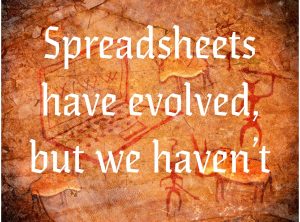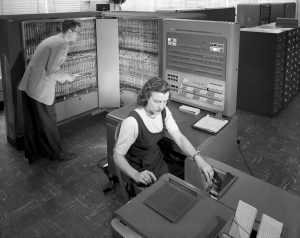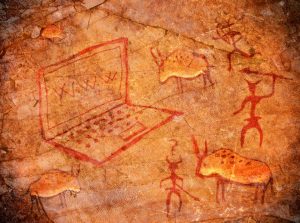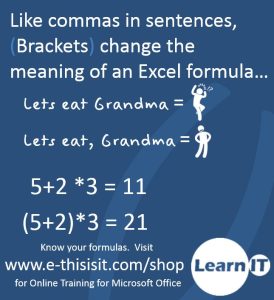 Prior to 3000BC, there was really no need for spreadsheets. It was a world without money where the standard practise was to barter.
Prior to 3000BC, there was really no need for spreadsheets. It was a world without money where the standard practise was to barter.
Humans of those days bartered anything they had at hand. Different ones produced different things and services and swapped them for other things they needed to get through. While this worked for a good while, the system started to outgrow the demands people where putting on it – for example, imagine this conversation:
“I’d like 2 stone bowls and 5 chickens, do you have change from a cow?”
Not only was there an issue with change, but you also had to find someone who had what you wanted, and wanted what you had to offer. And you thought banking systems today were complicated.
So it was around 3000BC that the first currency was “invented”. The shekel. The shekel referred to a specific weight of barley, which related to other values in a metric such as silver, bronze, copper etc, and things started to be valued in shekels.
Fast forward hundreds of years and “money” continued to evolve and people started using gold and silver as currency. It appears there was crime back then, and storing your gold was an issue. It was around 1700BC that the first bank opened, and the spreadsheet was born.
Just to proove that old fashions always come back full circle – they called them tablets. They were most likely clay tablets with the details of deposits and loans engraved by hand.
The earliest traces of paper found dates back to around 150BC. A long. time. ago. Pens had already been around for thousands of years before this, so I’m guessing that it was around this time that people started to use the paper ledger.
Then nothing happened for quite a few years, until in 1961 when a gentleman introduced the concept of an electronic spreadsheet.
Just to recap – for all these years, the role of a spreadsheet was to record numbers and data – nothing else. Niltch.

The modern day electronic spreadsheet as we know it today, in theory, dates back to as recently as 1978 – not all that long ago. It wasn’t very powerful and only had a total of 5 columns and 20 rows.
Skipping a few minor events, to 1983, and we have the launch of the first Excel-like spreadsheet – the Lotus 1-2-3! It was a huge improvement, and could chart, plot and be used as a database.
The next big event was in 1985 when Microsoft released their first version of Excel, with even more improvements including the ability to use a mouse pointer for selecting and, yes, drop down menus!
The rest is really history – Microsoft have released 13 versions since then, and today we have in our hands an extremely powerful tool.
But the problem is, we still use spreadsheets like cavemen.
Excel is still widely been used at it’s most basic level, which is really what it was originally designed to replace – the account ledger. But it’s capable of so much more than that. Consider this:
Of the 1520 assessment results analysed:
-23% did not know that a formula starts with an equals sign
-43% didn’t know how to use filters
-73% did not know about proper cell references
The spreadsheet evolved but we didn’t. If you’re not using formulas, you might as well use the paper ledger and a calculator, or a stone tablet for that matter.
What does this mean for companies.
Businesses should be worried about the lack of Excel skills for four reasons:
1) Excel is widely used – even if you have a fancy ERP, CRM, ASP, ACRS, or whatever system implemented by a CPA, MBA or even an SP, Nasa and JP Morgan use Excel, so someone, if not everyone, in your business is using Excel.
2) People who lack skills for any tool they use make mistakes, and although Excel isn’t going to cause direct bodily harm like a forklift could, it could cause enhanced aging and heart attacks when the stake holders get told there was a formula error in their yearly earnings report – and they need to change the title to yearly losses report.
3) People waste time when they don’t have the skills – it takes double the time or more to do everything.
4) All of the above.
Errors in Excel
73% did not know about proper cell references – this means there is a big risk that a formula could be copied down, and the cell references in the formula will change when they’re not designed to. If the employee is going to modify them by hand, that only reinforces my third and fourth points above.
25% didn’t know that brackets or no brackets change the meaning of a formula – like commas in a sentence, brackets in Excel change the meaning of a formula.
Lack of Efficiency and waste of time
When we looked at the questions relating to efficiency, that is when we realized just how much this is affecting business. This is no longer about know the basics, this is knowing the Excel shortcuts and tools you can use to get stuff done quicker, or in some cases, done at all. People would give up on some tasks long before it’s finished if they had to do it manually – and some people are persistent and do it anyway – spending hours on something they could have done in minutes, if they knew how.
For example:
Only 38% knew the shortcut for quickly copying info or formulas in one cell to all the ones below it – no matter how many rows that happens to be
Only 65% knew about the format painter. The format painter!
Only 65 users out of the 1520 even attempted the Advanced topics test, which includes things like PivotTables – a huge time saver for anyone wanting to analyse information – whether it be an accountant looking at figures, or a sales manager looking for insights into his sales – everyone can benefit from PivotTables, especially the company, but hardly anyone uses them.
You have been warned
The spreadsheet evolved but we didn’t. You have been warned.
Look into this in your own business, your team, or just yourself. Test your skills with our free online tests to see how you stack up: Click here for free Excel tests
If you are a manager or business owner – we can run a free online group test for all your staff (or the ones you want to test) – you have access to a dashboard to see the results as they come in, and we provide you with a consolidated report once they’re done – all for free. Click here for company assessments for Excel.
If you liked this article, please share!
I got inspiration from:
http://www.intelligentenvironments.com/info-centre/blog/from-tablets-to-tablets-a-brief-history-of-banking
https://en.wikipedia.org/wiki/History_of_money
https://en.wikipedia.org/wiki/Barter
https://en.wikipedia.org/wiki/History_of_paper
http://dssresources.com/history/sshistory.html
http://spreadsheetpage.com/index.php/resource/excel_version_history/







